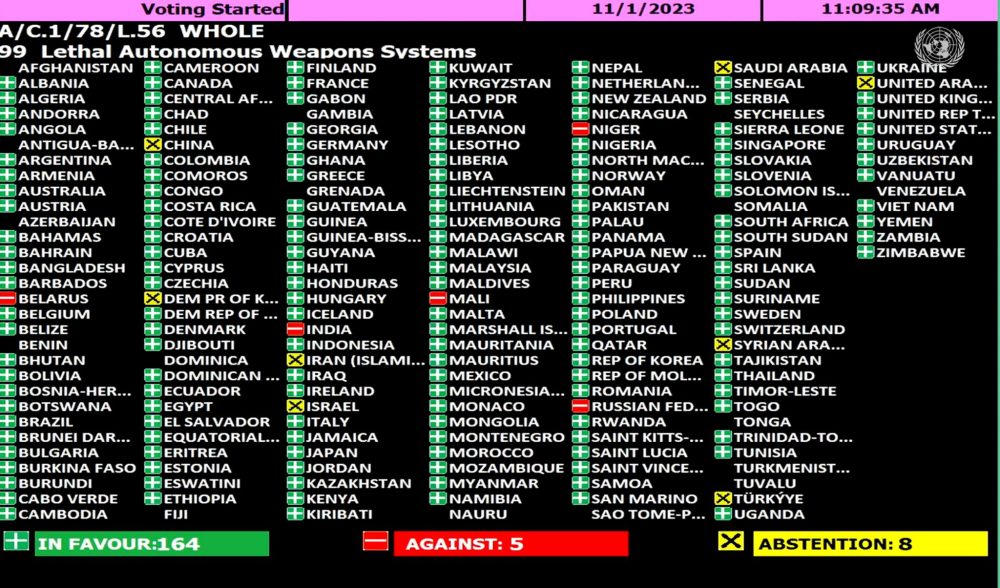Tabled by Austria and a group of 43 co-sponsoring states,* the resolution recognizes “the rapid development of new and emerging technologies” and references the “serious challenges and concerns that new technological applications in the military domain, including those related to artificial intelligence and autonomy in weapons systems, also raise from humanitarian, legal, security, technological and ethical perspectives.” It also expresses concerns about “the possible negative consequences and impact of autonomous weapon systems on global security and regional and international stability, including the risk of an emerging arms race, lowering the threshold for conflict and proliferation, including to non-State actors.”
The resolution requests the UN Secretary General prepare a report, reflecting the views of member and observer states on autonomous weapons systems and ways to address the related challenges and concerns they raise from humanitarian, legal, security, technological and ethical perspectives and on the role of humans in the use of force. The report will also include views of other stakeholders, including international and regional organisations, the International Committee of the Red Cross, civil society, the scientific community and industry. Critically, the resolution also decides that the provisional agenda of next year’s UNGA includes an agenda item entitled “Lethal autonomous weapons systems” – providing a further platform within UN fora for states to pursue action to address this issue.
The issue of autonomous weapons has received increasing international attention in 2023. In October 2023, the UN Secretary-General and the International Committee of the Red Cross President made a joint call for new international law on autonomous weapons, with the UN Secretary-General calling for states “to conclude by 2026 a legally binding instrument”. Building upon the joint statement by 70 states delivered at last year’s First Committee, this first ever UN resolution on autonomous weapons systems demonstrates that states see a need for action. The text was developed by a cross-regional group of states and through consultations in Geneva and New York. It has provided a much needed infusion of energy and purpose into ongoing international discussions on autonomous weapons, and an avenue to bring this important issue to the attention of all UN members.
Stop Killer Robots stands ready and willing to support all states committed to preventing digital dehumanisation and the automation of killing. Our coalition of more than 250 civil society organisations across 70 countries will not cease pushing for this outcome. The political momentum towards this goal is clear. We urge states to be on the right side of history.
*Co-sponsoring states: Antigua and Barbuda, Austria, Bahamas, Barbados, Belgium, Belize, Bulgaria, Cabo Verde, Costa Rica, Croatia, Cyprus, Czechia, Denmark, Dominican Republic, Ecuador, Fiji, Germany, Guatemala, Honduras, Hungary, Iceland, Ireland, Italy, Kazakhstan, Kiribati, Liechtenstein, Luxembourg, Maldives, Malta, Mexico, Montenegro, Netherlands, New Zealand, North Macedonia, Norway, Philippines, Republic of Moldova, San Marino, Sierra Leone, Slovenia, Sri Lanka, Switzerland, Trinidad and Tobago




